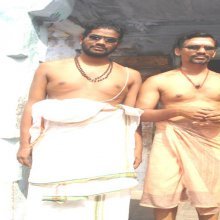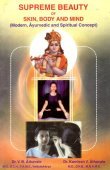Dosha, Dosa, Doṣa, Dosā, Doṣā, Ḍosā: 45 definitions
Introduction:
Dosha means something in Buddhism, Pali, Hinduism, Sanskrit, Jainism, Prakrit, the history of ancient India, Marathi, Hindi. If you want to know the exact meaning, history, etymology or English translation of this term then check out the descriptions on this page. Add your comment or reference to a book if you want to contribute to this summary article.
Dosha has 43 English definitions available.
The Sanskrit terms Doṣa and Doṣā can be transliterated into English as Dosa or Dosha, using the IAST transliteration scheme (?).
Alternative spellings of this word include Dosh.
Images (photo gallery)
Languages of India and abroad
Sanskrit dictionary
[Deutsch Wörterbuch]
Source: Cologne Digital Sanskrit Dictionaries: Böhtlingk and Roth Grosses Petersburger WörterbuchDoṣa (दोष):—
--- OR ---
Doṣa (दोष):—
--- OR ---
Doṣā (दोषा):—1. f. Abend, Nacht und doṣā adv. am Abend, in der Nacht s. u. 2. doṣa .
--- OR ---
Doṣā (दोषा):—2. f. = doṣan Arm [Medinīkoṣa ṣ. 15.]
--- OR ---
Doṣa (दोष):—1. n. auch [Mahābhārata 3, 13847]; vgl. die Note zu [Spr. 2862,] [?Th. 3, S. 380.] —
1) ein Fehler in der Argumentation [SARVADARŚANAS. 49, 18. 63, 11. 16. 79, 7. 80, 14. 141, 16. 147, 20.] doṣābhāva Fehlerlosigkeit [132, 16. fgg.] —
3) [Sp. 779, Z. 14] doṣamṛcchati [Manu’s Gesetzbuch 2, 93] ladet eine Schuld auf sich oder nimmt Schaden. na doṣaṃ labhate mahī ladet keine Schuld auf sich [Spr. 1433.] kuryurdoṣamadoṣasya bṛhaspatimaterapi könnten eine Schuld anhängen [1953.] śucerapi hi yuktasya doṣa eva nipātyate wird ein Fehler —, wird eine Schuld angehängt [Mahābhārata 12, 4142.] varaṃ tamupakartāraṃ doṣadṛṣṭyā ca dūṣayet [Spr. 5051.] —
4) naiṣa doṣaḥ es schadet Nichts [SARVADARŚANAS. 174, 17.]
--- OR ---
Doṣa (दोष):—
Source: Cologne Digital Sanskrit Dictionaries: Sanskrit-Wörterbuch in kürzerer FassungDoṣa (दोष):—1. —
1) m. nur. [Bhāgavatapurāṇa] Abend , Dunkel. Personif. als einer der 8 Vasu und als Gatte der Nacht. —
2) doṣā Abend , Dunkel. doṣām und doṣā (Instr.) am — , bei Abend , im Dunkeln , bei Nacht. Personif. als Gattin Puṣpārṇa’s und Mutter Pradoṣa's.
--- OR ---
Doṣa (दोष):—2. —
1) m. und (ausnahmsweise) n. (adj. Comp. f. ā) — a) Fehler , Schaden Mangel , Gebrechen , Fehlerhaftigkeit , eine fehlerhaft , schlechte , schädliche Eigenschaft Uebelstand. — b) Schlechtigkeit , Sündhaftigkeit. — c) Fehler , Verfehlung , Versehen , Vergehen , Verbrechen , Schuld , Sünde. — d) Nachtheil , Schaden. — e) üble Folge. doṣeṇa , doṣāt und doṣatas als üble Folge von und auch in Folge von (im Comp. vorangehend) überh. — f) Alteration , Affection. — g) verdorbene Säfte , ein gestörter Zustand und eine solche Thätigkeit der drei Flüssigkeiten des Körpers , welche Krankheit erzeugen ; krankhafte Affection , Krankheitsstoff , Krankheit. — h) die drei flüssigen Grundstoffe des menschlichen Leibes ; Luft (Wind) , Galle und Schleim , welche bei gestörtem Zustande Krankheit erzeugen. —
2) m. Kalb.
--- OR ---
Doṣā (दोषा):—1. f. Abend s. 1. doṣa 2).
--- OR ---
Doṣā (दोषा):—2. f. = doṣan.
Sanskrit, also spelled संस्कृतम् (saṃskṛtam), is an ancient language of India commonly seen as the grandmother of the Indo-European language family (even English!). Closely allied with Prakrit and Pali, Sanskrit is more exhaustive in both grammar and terms and has the most extensive collection of literature in the world, greatly surpassing its sister-languages Greek and Latin.
See also (Relevant definitions)
Starts with (+118): Dosaropana, Dosha-lagaunu, Doshabalapravritta, Doshabhaj, Doshabhakti, Doshabhasa, Doshabheda, Doshabhiti, Doshabhuta, Doshacara, Doshacaya, Doshacitta, Doshadarshi, Doshadosha, Doshadrishti, Doshadura, Doshadurate, Doshadure, Doshadurikarana, Doshadushita.
Ends with (+151): Abhutadosha, Adosha, Alamkaradosha, Amadosha, Anavasthadosha, Anekadosha, Annadosha, Apadosha, Apetadosha, Apramanadosha, Arthadosha, Ashanidosha, Ashrvadosha, Ashtadasha-dosha, Ashtamalagnadosha, Atidosha, Atmashrayadosha, Avidosha, Avikhyatadosha, Bahidosha.
Full-text (+1062): Doshakara, Doshasya, Doshatilaka, Doshas, Tridosha, Doshamanya, Mutradosha, Pradosha, Svapnadosha, Dosham, Doshagrahin, Kanyadosha, Doshajna, Karmadosha, Pathadosha, Doshatana, Vata, Vagdosha, Doshavastri, Dosharamana.
Relevant text
Search found 178 books and stories containing Dosha, Dosa, Doṣa, Dosā, Doṣā, Dōṣa, Dōṣā, Dōsa, Dōsā, Ḍosā; (plurals include: Doshas, Dosas, Doṣas, Dosās, Doṣās, Dōṣas, Dōṣās, Dōsas, Dōsās, Ḍosās). You can also click to the full overview containing English textual excerpts. Below are direct links for the most relevant articles:
Philosophy of Charaka-samhita (by Asokan. G)
The theory of three faults (tridoṣa-siddhānta) < [Chapter 3 - Fundamental Theories]
Theory of karma < [Chapter 8 - Ethics]
The locations, qualities, and the functions of the doṣas < [Chapter 3 - Fundamental Theories]
Kavyamimamsa of Rajasekhara (Study) (by Debabrata Barai)
Part 7.2 - Kavisamaya (poetic conventions) and Kāvyadoṣa (poetic blemish) < [Chapter 5 - Analyasis and Interpretations of the Kāvyamīmāṃsā]
Part 3.6 - Distinguish between Pratibhā and Vyutpatti < [Chapter 5 - Analyasis and Interpretations of the Kāvyamīmāṃsā]
Part 2 - Nātyaśāstra of Bharata-Muni < [Chapter 2 - A General Outlines of Sanskrit Poetics]
Malatimadhava (study) (by Jintu Moni Dutta)
Part 5.1-2 - Definition of Doṣa (poetic defects) < [Chapter 2 - Literary Study of the Mālatīmādhava]
Part 5.3a - Pada-doṣa (defects of word) < [Chapter 2 - Literary Study of the Mālatīmādhava]
Part 5.3b - Artha-doṣa (defect of sense) < [Chapter 2 - Literary Study of the Mālatīmādhava]
Atharvaveda and Charaka Samhita (by Laxmi Maji)
Trimarmīya (conditions of the bladder, heart and head) < [Chapter 4 - Diseases and Remedial measures (described in Caraka-saṃhitā)]
Visarpa (erysipelas) according to Caraka < [Chapter 4 - Diseases and Remedial measures (described in Caraka-saṃhitā)]
4b. Leprosy (Kuṣṭha) in the Caraka-saṃhitā < [Chapter 5 - Diseases and Remedies in Atharvaveda and Caraka-Saṃhitā]
A History of Indian Philosophy Volume 2 (by Surendranath Dasgupta)
Part 8 - Vāyu, Pitta and Kapha < [Chapter XIII - Speculations in the Medical Schools]
Part 9 - Head and Heart < [Chapter XIII - Speculations in the Medical Schools]
Part 11 - The Theory of Rasas and their Chemistry < [Chapter XIII - Speculations in the Medical Schools]
Brihad Bhagavatamrita (commentary) (by Śrī Śrīmad Bhaktivedānta Nārāyana Gosvāmī Mahārāja)
Verse 2.3.172 < [Chapter 3 - Bhajana (loving service)]
Verse 2.2.18 < [Chapter 2 - Jñāna (knowledge)]
Verse 2.2.59 < [Chapter 2 - Jñāna (knowledge)]
Related products
(+8 more products available)







